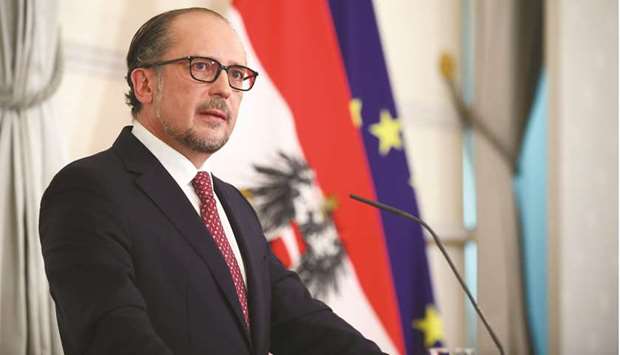Austria’s top diplomat Alexander Schallenberg took over as chancellor yesterday, as the ruling party tries to emerge from a corruption scandal that cost the job of one of Europe’s youngest leaders.
Sebastian Kurz, a 35-year-old once feted as a “whizz kid”, said late Saturday he was quitting the top job after being implicated in a corruption scandal.
Former Foreign Minister Schallenberg, 52, was sworn in by President Alexander Van der Bellen shortly after 1pm (1100 GMT).
Van der Bellen said the government now had the “great responsibility of restoring trust”.
Schallenberg gave a televised address in which he described his new office as an “honour”, albeit one “I never would have expected or wished for”.
Kurz’s centre-right People’s Party (OeVP) and their junior Green coalition partners are hoping to move on from the scandal and serve out the rest of their term until 2024. However, aftershocks from last week’s events may persist.
On Wednesday prosecutors raided several OeVP-linked locations, including the chancellery and party headquarters, over allegations that between 2016 and 2018 finance ministry resources were used to pay for opinion polls partially manipulated to paint Kurz in a good light.
Prosecutors allege that payments were made to a newspaper in return for publishing these surveys. The offices of the Oesterreich tabloid were also raided on Wednesday as part of the probe.
While Kurz initially insisted there was no reason for him to resign — and continues to vehemently protest his innocence — he then reversed course, saying he was putting the country before his own interests. But many say Kurz bowed to pressure from the Greens and from within his own party.
Schallenberg said in his statement that he would “of course work closely” with Kurz in his new role, pointing to Kurz’s two election victories and continued role as head of the OeVP.
This will play into opposition fears that Kurz will now simply become a “shadow chancellor” behind the scenes. The opposition parties say the “Kurz system” will carry on unhindered through the presence of ministers loyal to him, as well as high-ranking employees who look set to continue in post — some of whom are also suspects in the corruption inquiry.
According to press reports, Kurz himself contacted Schallenberg at 3am on Saturday morning to inform him that he would be his successor.
The latest scandal to hit Kurz adds to a list of corruption allegations against the OeVP and several of its prominent figures, including Finance Minister Gernot Bluemel.
Those allegations surfaced in the aftermath of the so-called “Ibiza-gate” affair that in 2019 brought down Kurz’s first government, a coalition between the OeVP and the far-right Freedom Party (FPOe).
Despite that Kurz came out on top in elections in autumn 2019 and re-entered government, this time at the head of a coalition with the Greens.

Austria’s new Chancellor of the People’s Party (OVP) Alexander Schallenberg addresses the media at the Federal Chancellery in Vienna yesterday. (Reuters)
